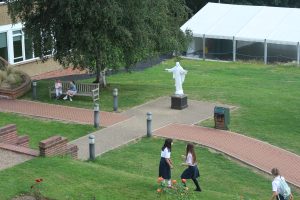Natural Law.
Mrs Corkery, Head of R.E. reports on what Lower VI have been studying:
‘In Core RE this term, Lower VI students have been busy discussing a variety of moral dilemmas in order to explore what influences their moral decision making. The girls have explored a variety of ethical theories, such as Natural Law, Divine Command Theory, Utilitarianism, Ethical Egoism and Humanism, and the application of these theories to real life contexts. Lucy wrote a fantastic essay, showing an excellent command of the many facets of Aquinas’ theory of Natural Law and we are pleased to reproduce it here:
Topic: Explain what Natural Law is with reference to Aquinas
Natural Law is based on the view that the universe has a natural order that works to achieve a telos. Scholars such as Buckle, have said that “the idea of Natural Law is sometimes described as the view that there is an unchanging, normative order that is part of the natural world”. As human beings are part of the natural world, they too must have a purpose. Natural Law is therefore an ethical theory based upon acting in ways that consistently move us as humans towards our goal.
St Thomas Aquinas
Despite the fact that Natural Law moves towards a goal or purpose, it is a normative deontological theory that identifies principles of duty – how all humans should behave. Some of the principles behind Aquinas’ Natural Law can be traced back to philosophers such as Aristotle, who thought that the teleological goal for man was to live life of a certain kind, that is, to be reasoning creatures and use reason to recognise how to behave in a moral way. It is when human beings act morally that their telos is fulfilled. Ultimately, Aristotle saw the goal of human life as eudaimonia and argued that we pursue other goals in order to ultimately achieve happiness.
‘Happiness’ to Aristotle was very different to pleasure, rather, happiness for Aristotle was living well and being fulfilled as it involved behaving rationally. Therefore, he thought that in making reasoned choices, one could be happy. Aquinas was influenced by Aristotle and agreed that rationality was a key element of human existence. Aquinas concurred with Aristotle that everything in the world had a purpose but unlike Aristotle, Aquinas believed that purpose was given by God. Aquinas believed that by applying reason to moral problems, one will find that they act in accordance with the Natural Law. Such acts are deemed good acts, or natural good, since they are aligned with our true human nature and purpose – which for Aquinas was to enjoy fellowship with God and to be perfect in the image of God. For Aquinas, eudaimonia could only be achieved in heaven when one experiences the beatific vision. Obeying Natural Law for Aquinas was a way to develop one’s human image to reflect as closely as possible the image of God, but that true perfection was not possible on earth.
Aquinas broke Natural Law down into five primary precepts, from which secondary precepts could then be deduced. Aquinas believed that the primary precepts apply to all human beings without exception and are good acts because they lead humans to their main purpose or goal. The fundamental idea behind the precepts is to “act in such a way as to achieve good and avoid evil”. The five precepts that Aquinas identified are: preserve innocent life; orderly living in society; worship God; education; and reproduction. Whether or not acts lead us towards God, and are therefore moral, is dependent upon whether the action fits the purpose that humans were made for. If the action fulfils the purpose then it is good. The primary precepts help human beings to identify what their God-given purposes are and therefore guide them in how to act morally. By acting morally and fulfilling their purposes, humans are brought closer to God and therefore will gain eternal life with God in heaven.
Secondary precepts can be deduced from the primary precepts. The difference between the primary and secondary precepts is that the primary precepts are always true and are held universally, without exception. In contrast, the secondary precepts are not strictly universal as they may not hold in certain circumstances. They are also derived from reasoning from the primary precepts – so are not absolutist, unlike the primary precepts. An example of a secondary precept would be ‘do not steal’, as stealing would go against the primary precept of ‘orderly living in society’. However, it is accepted that sometimes situations occur whereby not following secondary precepts may be supported by another primary precept. For example, if the act of stealing was for the purpose of feeding a hungry child then the precept of preserving innocent life would take precedence over the precept of orderly living in society. The ‘working out’ required is casuistry – “casuistry is the science of judging cases of conscience, or moral problems”. Natural Law always demands that a primary precept is adhered to.
Natural Law has influenced the Roman Catholic Church and ethical issues. For example, the Catholic Church upholds the primary precept of preserving human life by not allowing practices such as abortion and euthanasia. Similarly, the Catholic Church is against homosexual acts as it believes that they go against the primary precept of ‘reproduction’ as homosexual sexual acts cannot fulfil the telos of sex which is ultimately to bring new life to the world.’
Categories: Faith Life Sixth Form Whole School





